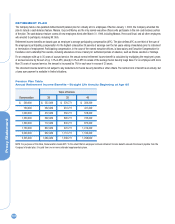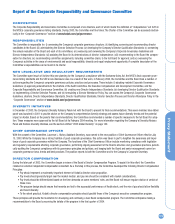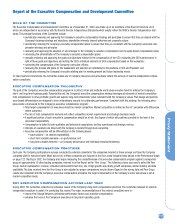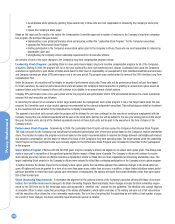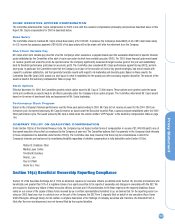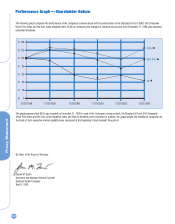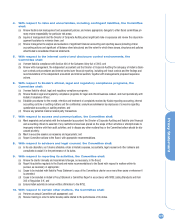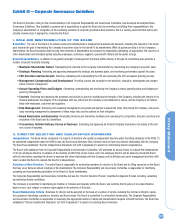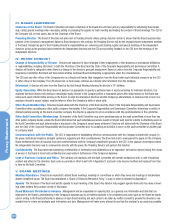Kodak 2003 Annual Report Download - page 121
Download and view the complete annual report
Please find page 121 of the 2003 Kodak annual report below. You can navigate through the pages in the report by either clicking on the pages listed below, or by using the keyword search tool below to find specific information within the annual report.
Proxy Statement
121
CHIEF EXECUTIVE OFFICER COMPENSATION
The Committee determined Mr. Carp’s compensation for 2003 in line with the executive compensation philosophy and practices described above in this
Report. Mr. Carp’s compensation for 2003 is described below:
Base Salary
The Committee chose to maintain Mr. Carp’s annual base salary at $1,100,000. To preserve the Company’s deductibility of all of Mr. Carp’s base salary
for U.S. income tax purposes, payment of $100,000 of his base salary will not be made until after his retirement from the Company.
Short-Term Variable Pay
Mr. Carp’s short-term variable pay, like that of all the Company’s other executives, is payable based upon the successful attainment of specific financial
goals established by the Committee at the start of each year under its short-term variable pay plan, EXCEL. For 2003, these financial goals were based
on revenue growth and economic profit. As reported earlier, the Company significantly exceeded its target revenue goal for the year and substantially
beat its threshold performance goal based on economic profit. The Committee also considered Mr. Carp’s performance against his key EXCEL perform-
ance goals. In particular, the Committee noted that the Company is on plan in the execution of its four key growth strategies, had mixed results with
respect to customer satisfaction, and had generally favorable results with regard to its leadership and diversity goals. Based on these results, the
Committee fixed Mr. Carp’s 2003 award at a level equal to what it established for the award pool after exercising negative discretion. The amount of the
award is listed in the Summary Compensation Table on page 104.
Stock Options
Effective November 19, 2003, the Committee granted a stock option award to Mr. Carp of 72,000 shares. These options were granted under the same
terms and conditions as awards made to all officers generally under the Company’s stock option program. The Committee determined Mr. Carp’s award
based on its review of benchmark data and assessment of Mr. Carp’s leadership.
Performance Stock Program
Based on the Company’s financial performance over the three-year period ending in 2003, Mr. Carp did not receive an award for the 2001-2003 per-
formance cycle. As reported previously, Mr. Carp did receive an award under the Executive Incentive Plan, a special program established under the 2002-
2004 performance cycle. The award earned by Mr. Carp is listed under the column entitled “LTIP Payouts” in the Summary Compensation Table on page
104.
COMPANY POLICY ON QUALIFYING COMPENSATION
Under Section 162(m) of the Internal Revenue Code, the Company may not deduct certain forms of compensation in excess of $1,000,000 paid to any of
the named executive officers that are employed by the Company at year-end. The Committee believes that it is generally in the Company’s best interests
to have compensation be deductible under Section 162(m). The Committee also feels, however, that there may be circumstances in which the
Company’s interests are best served by maintaining flexibility regardless of whether compensation is fully deductible under Section 162(m).
Richard S. Braddock, Chair
Martha Layne Collins
Timothy M. Donahue
Debra L. Lee
Paul H. O’Neill
Hector de J. Ruiz
Section 16(a) Beneficial Ownership Reporting Compliance
Section 16 of the Securities Exchange Act of 1934, as amended, requires our executive officers (as defined under Section 16), directors and persons who
beneficially own greater than 10% of a registered class of our equity securities to file reports of ownership and changes in ownership with the SEC. We
are required to disclose any failure of these executive officers, directors and 10% stockholders to file these reports by the required deadlines. Based
solely on our review of the copies of these forms received by us or written representations furnished to us, we believe that, for the reporting period cov-
ering our 2003 fiscal year, due to a clerical error on the part of the Company, the SEC Form 3 originally filed on behalf of one executive officer, Karen
Smith-Pilkington, although timely, did not contain a complete description of her holdings of Company securities and, therefore, the Amended Form 3,
filed after the error was discovered, was not deemed filed by the required deadline.



